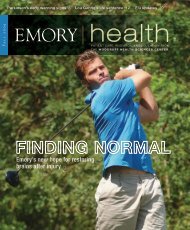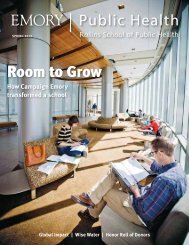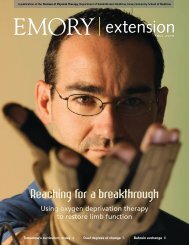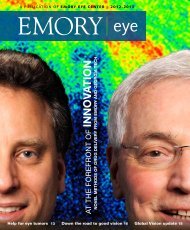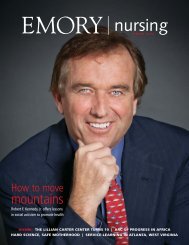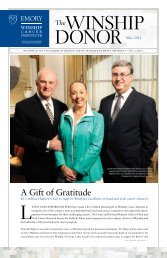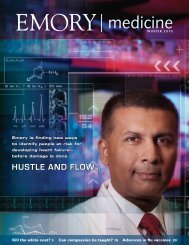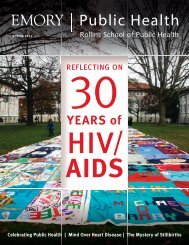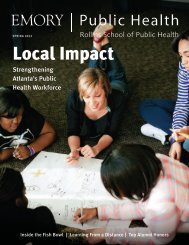returning quality to life - Woodruff Health Sciences Center - Emory ...
returning quality to life - Woodruff Health Sciences Center - Emory ...
returning quality to life - Woodruff Health Sciences Center - Emory ...
You also want an ePaper? Increase the reach of your titles
YUMPU automatically turns print PDFs into web optimized ePapers that Google loves.
jump, and pho<strong>to</strong>graphs document his visit<br />
with the French family who protected him<br />
decades ago.<br />
Being a veteran has not been easy<br />
for members of the greatest generation.<br />
Although some never speak of their military<br />
experiences, memories bubble up in nightmares,<br />
unease, and flashes of anger or anxiety.<br />
One of Holland’s formerly silent patients,<br />
Gerald “Bud” Hipps, joined the Marines<br />
immediately after Pearl Harbor. When the<br />
17-year-old arrived at Iwo Jima soon after,<br />
the black volcanic sand beaches were littered<br />
with American bodies. He endured 36 days<br />
of one of the bloodiest battles in the Pacific<br />
theater. Of the 240 men in his company, only<br />
27 returned. Coming home with a Purple<br />
Heart, the decorated veteran wanted nothing<br />
<strong>to</strong> do with war, refusing <strong>to</strong> watch war movies<br />
or apply for government funds. For years,<br />
he was unable <strong>to</strong> bear anyone, even his wife,<br />
walking behind him. He often screamed out<br />
at night and flailed wildly. When he was in<br />
his 80s, what changed things for Hipps was<br />
an “I survived Iwo Jima” bumper sticker. To<br />
the amazement of his family, he made one<br />
of his own. Strangers began <strong>to</strong> thank him or<br />
honk their horns and wave. His grandchildren<br />
looked at him with respect. He now<br />
speaks at their schools, at community gatherings,<br />
and <strong>to</strong> the local media.<br />
Reading about others’ experiences in the<br />
books at the Bronze Clinic and speaking for<br />
the first time about their own memories has<br />
been therapeutic for several of the clinic’s<br />
older patients, says Holland. It has led <strong>to</strong><br />
recognition of problems that have troubled<br />
the veterans throughout their lives and <strong>to</strong><br />
treatment that has helped mitigate those<br />
problems.<br />
The willingness of Holland’s veteran<br />
patients <strong>to</strong> talk has been a great gift <strong>to</strong> families,<br />
many of whom did not realize they had a<br />
hero in their midst. It also has been a “familial<br />
experience for the caregivers at the VA,”<br />
says Holland, “giving us more insight in<strong>to</strong> the<br />
lives of our patients.”<br />
As direc<strong>to</strong>r of <strong>Emory</strong>’s geriatric fellowship<br />
program, which trains hundreds of<br />
medical students and residents at the Atlanta<br />
VAMC, Holland has another reason <strong>to</strong> be<br />
grateful <strong>to</strong> the veterans. “Our students are<br />
learning that what people have done in their<br />
lives can be as important <strong>to</strong> their health as<br />
the medical problems they are experiencing.<br />
They are learning <strong>to</strong> think of patient his<strong>to</strong>ries<br />
in a whole new way.<br />
“For the Bronze Clinic team now, and<br />
for the physicians these young people will<br />
become,” adds Holland, “giving our patients<br />
the opportunity <strong>to</strong> sign these books has<br />
provided another way both <strong>to</strong> understand<br />
the service of our greatest generation and <strong>to</strong><br />
honor the courage and sacrifices they made<br />
for our freedom.” EH<br />
The partnership between <strong>Emory</strong><br />
and the Atlanta VA stretches over<br />
six decades. Each year, more than 250<br />
<strong>Emory</strong> doc<strong>to</strong>rs and 142 residents provide<br />
virtually all physician care at the VA’s<br />
hospital and nursing home. <strong>Emory</strong> scientists<br />
have helped place the Atlanta VA<br />
among the nation’s <strong>to</strong>p VA centers for<br />
research, with more than 500 research<br />
projects directed at the most serious<br />
health problems faced by veterans.<br />
In 1999, the Bronze Outpatient<br />
Geriatric Clinic opened <strong>to</strong> help veterans<br />
75 and older maintain health and independence.<br />
A team of physicians, a nurse<br />
practitioner, nurses, pharmacists, and<br />
social workers collaborate with physical<br />
therapists, audiologists, psychiatrists,<br />
and others. Holland and Priscilla Zahn,<br />
manager of geriatrics and extended<br />
care, were original founding physicians.<br />
While most veterans in north Georgia<br />
are seen in multiple VA communitybased<br />
outpatient clinics, approximately<br />
2,500 patients—usually the most frail,<br />
with the most complicated medical<br />
conditions—call the Bronze Clinic their<br />
medical home.<br />
Winter 2011 27



